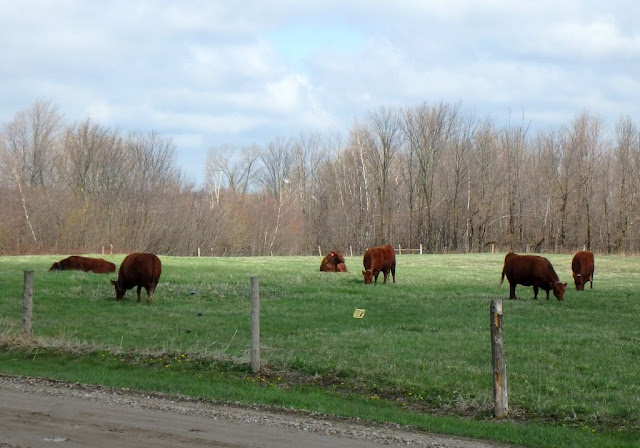The cows spent two weeks in the north field. They could have stayed longer, but I wanted to give the grass time to recover:
I don't understand why the north field grass grows better than the grass in the south field, but it does. The Red Poll girls were certainly appreciative:
They don't really have any protection from the elements in the north field, but they don't seem to care. But then again, I only put them over there in good weather:
And they thank the field for its nutrients by spreading manure wherever they go:
They had a peaceful and nutritious two weeks:
The two horses stayed in the south field where I could keep an eye on their mischievous ways:
I continued to bring the cows grain twice a day. I even sprinkled free choice minerals on each bowl of grain since I began to fear that the death of Amy's calf might have been caused by a selenium deficiency:
And the chickens ran madly to join us whenever I began putting down bowls of grain. Their strategy was to gobble up the grain in any bowl left unattended for even a few seconds. Failing that, they were happy to eat what the cows, sloppy eaters that they are, dribbled in the grass:
Besides the added nutrition, the grain helps keep the cows tame and friendly. They are always happy to see me:
But not so happy to see the chickens, thieving little buzzards that they are:
All in all, it was a wonderful two weeks. I moved them back to the south field, but the north field is recovering so quickly that I will probably move the cows back any day now:
The south field, for all that its a larger size, does not grow grass at such a rate as the north field. This is Gracie near the barn in the south field. They have plenty to eat, but it's not long and luscious like it is across the gravel road:













Bill, did Amy's daughter get her calfhood vaccination for brucellosis? Were any of Amy's teats blocked? Her udder was so swollen, but she was a prodigious producer of milk so that was likely the reason. Did the vet have any diagnosis? It is good that you are adding supplements along with their two weeks of fresh grass in the north field. You are a very good stockman!
ReplyDeleteAmy's calf was not vaccinated. I don't know if any of Amy's teats were blocked but I don't believe so as she looked the same last year. As for the vet, he never got to see the calf as she died so quickly, but he often says that selenium deficiency is the most common reason for calf death around here. Of course Amy had access to free choice minerals but I can't be sure she made use of them. The vet will be out soon to tend to the horses, so I hope to discuss this with him more fully then. Thank you for your interest and comment.
Delete